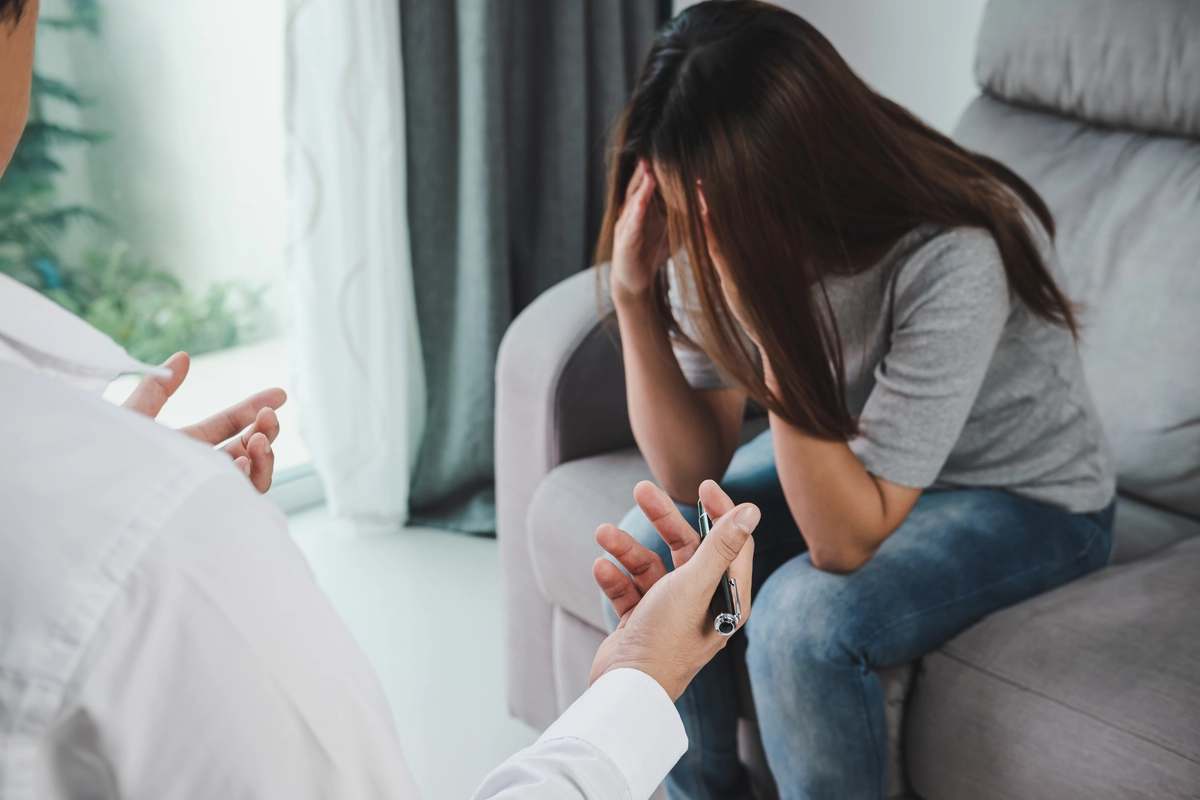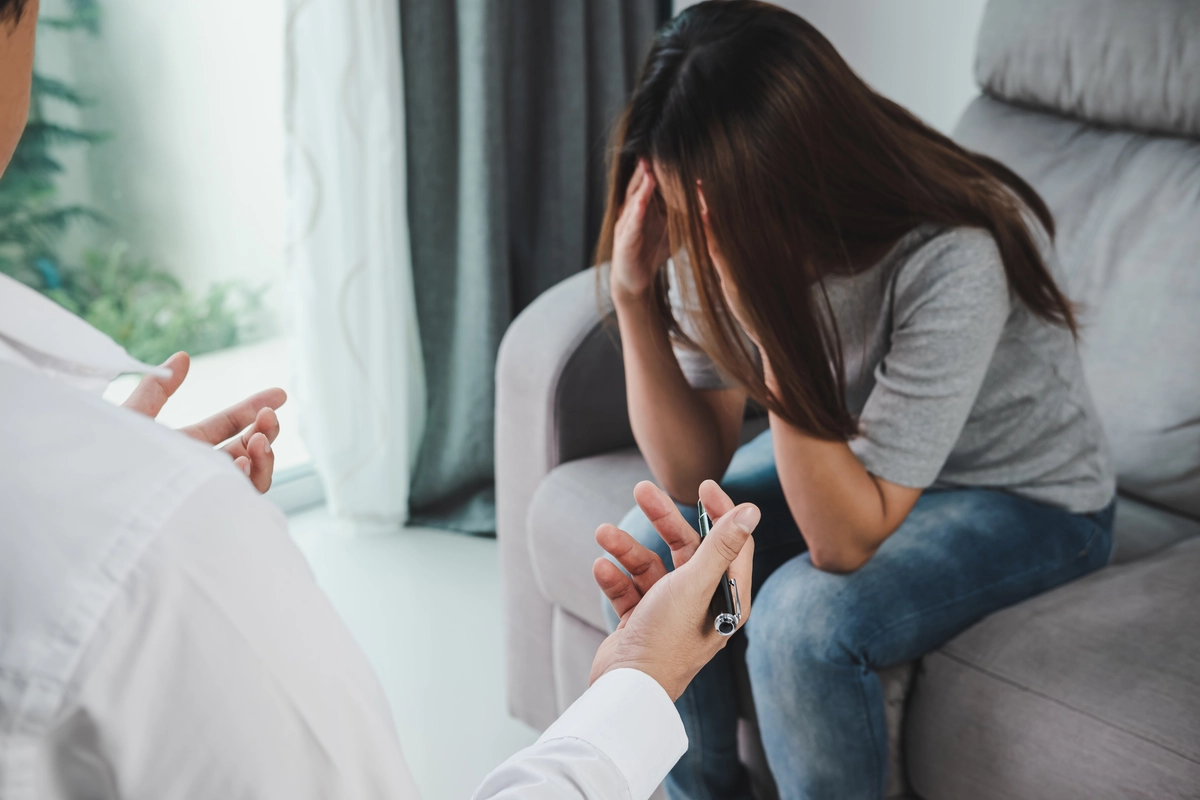24/7 Helpline:
(866) 899-221924/7 Helpline:
(866) 899-2219
Learn more about PTSD Treatment centers in Logan County

Other Insurance Options

Kaiser Permanente

Oxford

Meritain

United Health Care

American Behavioral

Providence

Coventry Health Care

Regence

EmblemHealth
Beacon

Medical Mutual of Ohio

Excellus

PHCS Network

Lucent

Self-pay options

Group Health Incorporated

Absolute Total Care

GEHA

Anthem

Holman Group

Human Resources Center of Edgar and Clark Counties
Human Resources Center of Edgar and Clark Counties is a non-profit rehab located in Paris, Illinois....

Bourbon Community Hospital – Stoner Creek Behavioral Health Centre
Bourbon Community Hospital – Stoner Creek Behavioral Health Centre is a private rehab located in Par...

Region IV Timber Hills Mental Health Services
Region IV Timber Hills Mental Health Services is a co-occurring drug and alcohol addiction treatment...

Region IV Mental Health Services
Region IV Mental Health Services is a non-profit rehab located in Booneville, Mississippi. Region IV...

Maryhaven Delaware
Maryhaven Delaware is a private rehab located in Delaware, Ohio. Maryhaven Delaware specializes in t...

Central Ohio Mental Health Center – South Henry Street
Central Ohio Mental Health Center – South Henry Street is a private rehab located in Delaware, Ohio....

Moses Taylor Hospital – Mental Health
Moses Taylor Hospital – Mental Health is a private rehab located in Scranton, Pennsylvania. Moses Ta...

Geisinger Community Medical Center – Behavioral Health
Geisinger Community Medical Center – Behavioral Health is a private rehab located in Scranton, Penns...

Jewish Family Service
Jewish Family Service is a private rehab located in Scranton, Pennsylvania. Jewish Family Service sp...

A Better Today
A Better Today is a private rehab located in Scranton, Pennsylvania. A Better Today specializes in t...

Minsec Scranton
Minsec Scranton is a private traditional halfway house located in Scranton, Pennsylvania. Minsec Scr...

Turning Point Alternative Living Solutions – TPALS
Turning Point Alternative Living Solutions (TPALS) is an outpatient behavioral and addiction recover...

Friendship House – Scranton
Friendship House – Scranton is a private rehab located in Scranton, Pennsylvania. Friendship House –...

Drug and Alcohol Treatment Service – Outpatient
Drug and Alcohol Treatment Service – Outpatient is a private rehab located in Scranton, Pennsylvania...

Hope Center Ministries – Paris Women’s Center
Hope Center Ministries - Women's Center is a rehab facility, specializes in the treatment of alcohol...















































The Guidance Center
The Guidance Center is a private rehab located in Booneville, Arkansas. The Guidance Center speciali...

ABBCON Counseling – Edgar Treatment Center
ABBCON Counseling – Edgar Treatment Center is a private rehab located in Paris, Illinois. ABBCON Cou...

Bluegrass – Bourbon County
Bluegrass - Bourbon County is located in Paris, Kentucky. Bluegrass - Bourbon County assists individ...

Trainings Unlimited
Trainings Unlimited is a private rehab located in Paris, Kentucky. Trainings Unlimited specializes i...

Hope Network Paris Center
Hope Network Paris Center is a private rehab located in Paris, Michigan. Hope Network Paris Center s...

Village Network – Delaware
Village Network – Delaware is a private rehab located in Delaware, Ohio. Village Network – Delaware ...

Star Center
Access Ohio is a dual diagnosis substance use disorder rehab in Delaware, OH for men and women. This...

Mid Ohio Psychological Services
Mid Ohio Psychological Services is a private rehab located in Delaware, Ohio. Mid Ohio Psychological...

Recovery & Prevention Resources
Recovery & Prevention Resources is a private rehab located in Delaware, Ohio. Recovery & Prevention ...

Dunmore Comprehensive Treatment Center
Dunmore Comprehensive Treatment Center is a private rehab located in Scranton, Pennsylvania. Dunmore...

Clear Brook
Clear Brook is a private rehab located in Scranton, Pennsylvania. Clear Brook specializes in the tre...

PA Treatment & Healing – PATH
PA Treatment & Healing (PATH) is an outpatient facility that offers treatment for individuals with a...

Lourdesmont Youth and Family Services
Lourdesmont Youth and Family Services provides community-based services for children, youth and fami...

Scranton Counseling Center
Scranton Counseling Center is a private, nonprofit mental health and substance abuse rehabilitation ...

Carey Counseling Center – Paris
Carey Counseling Center – Paris is a private rehab located in Paris, Tennessee. Carey Counseling Cen...

Pierce and Agnew
Pierce and Agnew is a private rehab located in Paris, TX. Pierce and Agnew specialize in the treatme...

Lakes Regional Mental Health – Cherry Street
Lakes Regional Mental Health - Cherry Street offers outpatient and intensive outpatient treatment fo...

Lakes Regional Mental Health – 2870 N. Main Street
Lakes Regional Mental Health - 2870 N. Main Street offers outpatient and intensive outpatient treatm...

Lakes Regional Mental Health – 395 North Main Street
Lakes Regional Mental Health - 395 North Main Street offers outpatient and intensive outpatient trea...






































































































